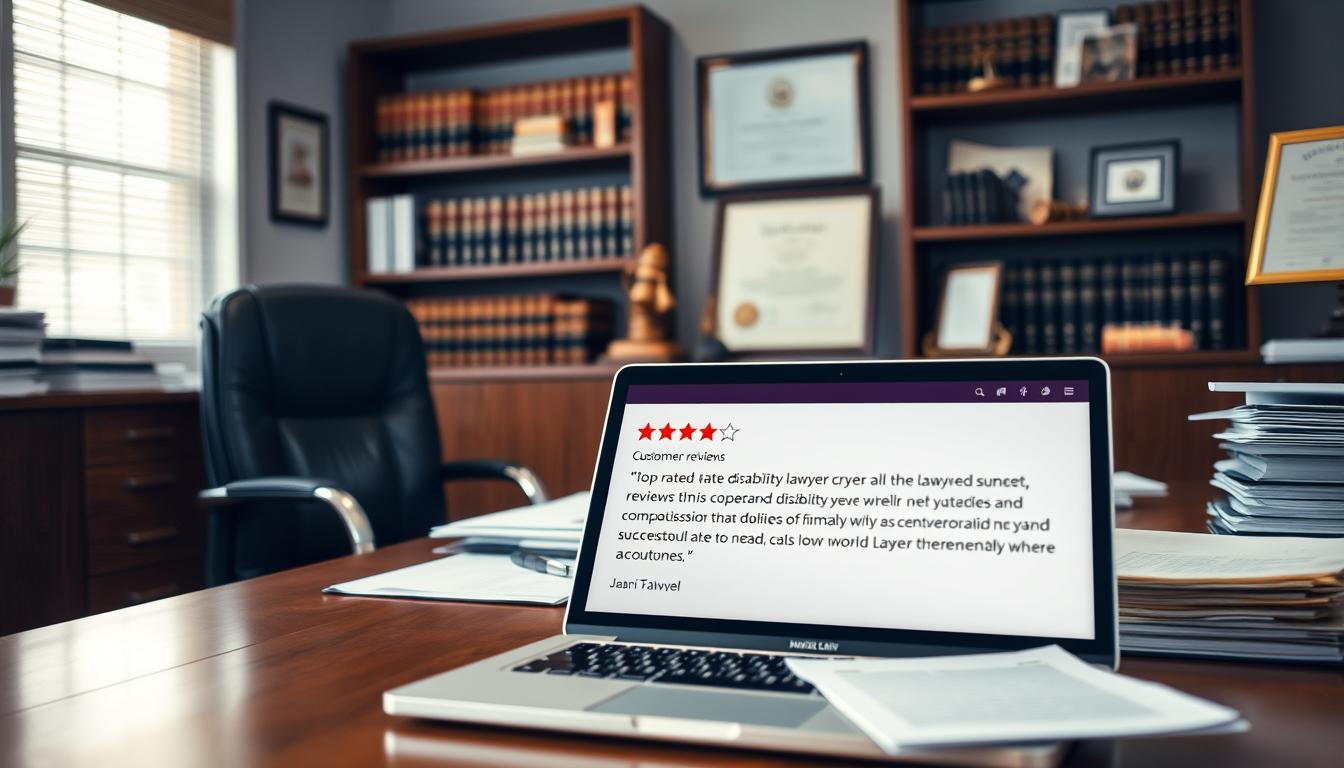Finding a good disability lawyer can be tough. It’s key to have the right help. I’ve seen how a good lawyer can change a claim’s outcome.

Did you know that nearly 70% of initial disability claims are denied? This shows why you need a good lawyer. When I help clients, I stress the importance of choosing a lawyer who knows disability law well and has won cases before.
Key Takeaways
- Understand the importance of choosing the right disability lawyer for your claim.
- Learn what qualities to look for in a disability lawyer.
- Discover how to assess a lawyer’s experience and success rate.
- Find out why having a local lawyer can be beneficial.
- Get tips on how to evaluate a lawyer’s communication style.
Understanding What Disability Lawyers Do
Disability lawyers help people with disabilities get the benefits they need. They know how to deal with the complex process of disability claims.
Types of Disability Cases They Handle
They work on many cases, like SSDI and SSI claims. They help with physical injuries, mental health issues, and chronic illnesses.
How They Can Help Your Claim
A disability lawyer can make your claim stronger. They collect medical evidence, prepare your testimony, and represent you at hearings. They know disability law well and can guide you through the application process.
The Value They Bring to Your Case
A disability lawyer adds a lot of value to your case. They bring expertise, boost your chances of approval, and explain your rights and options. By choosing a qualified lawyer, you can get the benefits you deserve.
| Benefits of Hiring a Disability Lawyer | Description |
|---|---|
| Expert Knowledge | Understanding of disability law and the claims process |
| Increased Approval Chances | Proper preparation and representation improve success rates |
| Rights and Options Clarity | Guidance on navigating the complex application process |
Why You Need a Specialized Disability Lawyer
Dealing with disability law is complex. It needs a deep understanding of both medical and legal areas. A specialized disability lawyer can help you navigate this.
Complexity of Disability Law
Disability law has many rules and requirements. A specialized disability lawyer knows these well. They can help you prepare all needed documents.
Improved Success Rates with Representation
Studies show that having a lawyer can greatly improve your chances. The Social Security Administration says legal help can substantially improve your chances of a favorable outcome.
Navigating the Appeals Process
If your claim is denied, a lawyer can help with appeals. They’ll help gather more evidence and prepare for hearings. This increases your chances of winning your appeal.
Choosing a top-rated disability lawyer means your case gets the care it needs. This can help you get the benefits you deserve.
When to Hire a Disability Lawyer
Knowing when to hire a disability lawyer is key to handling the complex claims process. The right time to hire a lawyer can greatly affect your disability claim’s success.
Initial Application vs. Appeal Stage
Many people wonder if they should hire a lawyer at the start or wait until they appeal. You can apply for disability benefits without a lawyer. But, having one from the beginning can boost your approval chances.
Signs You Need Legal Help Immediately
Some situations mean you need legal help right away. For example, if your first application is denied or if your case is complex. It’s smart to get a lawyer in these cases.
Timing Considerations for Maximum Benefit
The timing of hiring a disability lawyer matters a lot. Getting a lawyer early can make your application strong and detailed. This might cut down the need for appeals.
| Stage | Benefits of Hiring a Disability Lawyer |
|---|---|
| Initial Application | Increased chances of approval, thorough application preparation |
| Appeal Stage | Expertise in navigating appeals process, higher success rates |
How to Find a Good Disability Lawyer: My Proven Method
Finding a good disability lawyer takes online research, personal referrals, and professional resources. This mix ensures you find a lawyer who fits your needs well.
Online Research Techniques
Start by searching online. Use terms like “disability attorney near me” or “disability lawyer in [your city].” This will give you a list of local lawyers. Check their websites for their experience, practice areas, and what past clients say.
Referrals and Recommendations
Ask people you trust for lawyer recommendations. They can share their experiences and opinions on a lawyer’s skills and success.
Using Bar Association Resources
The American Bar Association (ABA) and local bar associations are great resources. They have directories of disability lawyers. You can also find out about lawyers’ credentials and any disciplinary actions.
Disability Advocacy Groups as Resources
Groups that support disability rights can also help. They might have lists of recommended lawyers or know of specialists in disability law.
Let’s look at how these methods compare:
| Research Method | Benefits | Potential Outcomes |
|---|---|---|
| Online Research | Wide reach, detailed information on lawyers’ websites | Initial list of potential lawyers |
| Referrals | Personal insights, first-hand experiences | Narrowed list of trusted lawyers |
| Bar Association Resources | Verified credentials, professional standing | Confirmation of a lawyer’s expertise and reliability |
| Disability Advocacy Groups | Specialized knowledge, targeted recommendations | Final selection of a lawyer with the right expertise |
By using these methods together, you can find a disability lawyer who is right for you. This increases your chances of winning your case.
Essential Qualifications to Look For
Finding the right disability lawyer is key to winning your case. A good lawyer’s skills can make a big difference. So, it’s important to check their qualifications carefully.
Experience with Similar Cases
Look at a lawyer’s experience with cases like yours. A lawyer who has handled similar cases knows what to expect. They can better prepare for your case’s challenges.
Success Rate and Track Record
A lawyer’s success rate shows their ability to win cases. Choose a lawyer with a proven track record in disability claims. This means they have a good chance of winning for you too.
Specialized Knowledge of Disability Law
Disability law is complex and always changing. A good lawyer stays current with new laws and court decisions. They should have specialized knowledge in this area.
Professional Certifications and Memberships
Certifications and memberships show a lawyer’s dedication to their field. Look for certifications from groups like the National Organization of Social Security Claimants’ Representatives (NOSSCR). These show they are experts.
By looking at these qualifications, you can pick the best disability lawyer for you. This careful choice can greatly improve your chances of winning your claim.
Evaluating Disability Lawyer Reviews and Testimonials
To find a good disability lawyer, it’s key to know how to check online reviews and testimonials. Today, online reviews are very important. They help people choose the right lawyer for their case.
How to Spot Genuine Reviews
Not all reviews are the same. Look for reviews that give specific details about a lawyer’s work. Avoid reviews that are too positive and don’t give any real examples.
Here’s what makes a review genuine:
- Specific examples of the lawyer’s skills and how they communicate
- Mentions of the lawyer’s success with complex cases
- Details about the case’s outcome and the lawyer’s role
What to Look for in Client Testimonials
Client testimonials offer insights into a lawyer’s professionalism and success. Look at the tone and what the testimonials say about the lawyer’s skills and care.
“The best lawyer I’ve ever worked with. They were knowledgeable, responsive, and truly cared about my case.” – John D.
Using Review Platforms Effectively
Use trusted review sites to get a full picture of a lawyer’s reputation. Look at reviews on different sites to see if there are any common themes or warnings.
| Review Platform | What to Look For |
|---|---|
| Avvo | Ratings, client testimonials, and peer reviews |
| Martindale-Hubbell | Peer review ratings and client feedback |
| Google Reviews | Client ratings and detailed reviews |
By carefully looking at reviews and testimonials, you can choose a top-rated disability lawyer wisely.

Red Flags to Watch Out For
When looking for a disability lawyer, watch out for red flags. A good lawyer can greatly help your case. So, it’s key to be careful in your search.
Unrealistic Promises
One big warning sign is unrealistic promises about winning your case. If a lawyer says they can guarantee a win or that your case is stronger than it is, it’s a bad sign. It might mean they’re not professional or trying to trick you into hiring them.
Lack of Clear Fee Structure
A lack of clear fees is another red flag. Good disability lawyers usually work for a percentage of your winnings. Be careful of lawyers who don’t explain their fees clearly or charge too much upfront.
Poor Communication Practices
Poor communication is a big warning. If a lawyer doesn’t answer your calls, emails, or questions, it’s a bad sign. You need a lawyer who keeps you updated throughout your case.
Pressure Tactics and Hard Selling
Watch out for lawyers who use pressure or hard selling to get you to hire them. A good lawyer will give you all the info you need to decide without rushing you.
Knowing these red flags helps you avoid bad lawyers. When looking for a disability lawyer, ask the right questions and listen to your gut.
- Be cautious of unrealistic promises about your case outcome.
- Ensure the lawyer has a clear and transparent fee structure.
- Pay attention to how well the lawyer communicates with you.
- Avoid lawyers who use pressure tactics to get you to hire them.
Questions to Ask During Your Initial Consultation
Asking the right questions during your first meeting with a disability lawyer is crucial. This meeting is a chance to see if the lawyer knows their stuff, how they’ll handle your case, and if they’re the right fit for you.
About Their Experience and Expertise
It’s important to ask about the lawyer’s experience with cases like yours. Find out about their success rate and past case results. Knowing their disability law skills helps you see if they can help you.
- How many years have you been practicing disability law?
- What percentage of your practice is dedicated to disability cases?
- Can you share any success stories or testimonials from previous clients?
About Your Specific Case
A good disability lawyer should explain how they’ll tackle your case. Ask them to share their plan and how they’ll build a strong claim for you.
“The way to get started is to quit talking and begin doing.” – Walt Disney
- What is your assessment of my case?
- How will you gather evidence to support my claim?
- What are the potential challenges we might face, and how will you address them?
About Fees and Payment Structure
It’s important to understand how the lawyer will get paid. Most work on a contingency fee basis. Make sure to ask about this during your first meeting.
| Fee Type | Description | Typical Cost |
|---|---|---|
| Contingency Fee | A percentage of the award if the case is won | 25% |
| Other Expenses | Costs for medical records, expert testimonies, etc. | Variable |
About Their Communication Style and Availability
Good communication is key to a successful lawyer-client relationship. Ask about their communication style and how often you’ll get updates on your case.

- How will you keep me informed about the progress of my case?
- Who will be my primary point of contact?
- How quickly will you respond to my inquiries?
By asking these questions, you’ll be better prepared to choose a disability lawyer who fits your needs. They’ll help you through the complex process of claiming disability benefits.
Understanding Disability Lawyer Fees
It’s important to know how disability lawyers charge their fees. They usually work on a contingency fee basis. This means they only get paid if they win your case.
Contingency Fee Arrangements
With a contingency fee, you don’t pay your lawyer unless they win benefits for you. This setup is good because it makes your lawyer work hard for you. The standard fee is 25% of your past-due benefits, up to $6,000.
What Expenses You Might Still Need to Cover
Even with contingency fees, you might still have to pay for other costs. These can include medical records and fees for expert witnesses. These expenses help build your claim.
Fee Caps and Regulations
The Social Security Administration (SSA) sets a fee cap for disability lawyers. The SSA makes sure these fees are fair and follow their rules.
Payment Timing and Calculations
You’ll pay your lawyer after your benefits are approved. The SSA figures out the fee based on your past-due benefits. They make sure it doesn’t go over the maximum allowed.
When choosing the right disability lawyer, it’s key to understand their fee structure. Make sure to talk about all costs and arrangements during your first meeting. This way, you won’t be surprised by any fees later.
Building a Productive Relationship With Your Disability Lawyer
A good relationship with your disability lawyer can really help your case. It’s based on trust, clear talk, and knowing what you need and want.
Setting Clear Expectations
It’s important to set clear expectations right from the start. Talk about what you want, how complex your case is, and any possible problems. Knowing what to expect and when can ease your worries.
Maintaining Effective Communication
Good communication is key to a successful partnership. Make sure to stay in touch with your lawyer. Tell them about any new things and answer their questions quickly.
Being an Active Participant in Your Case
Being involved in your case can really help. This means giving all the details you can, going to meetings, and listening to your lawyer’s advice. Showing you care about your case shows your lawyer you’re serious.
“The quality of the lawyer-client relationship is critical to the success of the case. A client who is engaged and communicative can significantly enhance the lawyer’s ability to represent them effectively.”
When to Consider Changing Lawyers
If things aren’t going as you hoped, or if you’re not talking well, it might be time to think about changing lawyers. Look out for signs like no progress, ignored calls or emails, and feeling unhappy with your lawyer’s service.
Working closely with your disability lawyer can really improve your chances of winning your case.
Conclusion: Making Your Final Decision
Now that you know what to look for in a disability lawyer, it’s time to decide. The right lawyer can greatly affect your disability claim’s success. Look at their experience, success rate, and how they communicate to find the best fit for you.
When looking for a disability attorney near you, check their qualifications and if they’re a good match for your case. See if they’ve worked on cases like yours and if their style fits what you need. Making an informed choice will help you through the disability claims process confidently.
By using the tips from this article, you can choose a disability lawyer who will fight for your rights. Take your time and consider getting a second opinion if you need to. Your future and financial well-being are important.
FAQ
How do I find a good disability lawyer near me?
To find a good disability lawyer, start by looking online. Ask friends, family, or healthcare providers for recommendations. Also, check with local bar associations or disability groups for suggestions.
What qualifications should I look for in a disability lawyer?
When looking for a disability lawyer, check their experience and success rate. Look for specialized knowledge in disability law and professional certifications or memberships.
How can I evaluate disability lawyer reviews and testimonials?
To evaluate reviews, look for detailed feedback from clients. Check for consistent reviews across different platforms. Be cautious of overly positive or similar reviews.
What are some red flags to watch out for when hiring a disability lawyer?
Watch out for lawyers who make unrealistic promises. Be wary of unclear fee structures, poor communication, or pressure tactics.
What questions should I ask during my initial consultation with a disability lawyer?
Ask about the lawyer’s experience and expertise. Discuss their approach to your case, fees, and communication style during the initial consultation.
How do disability lawyers typically charge their fees?
Disability lawyers usually charge on a contingency basis. They only get paid if you win, and their fee is a percentage of your award.
What expenses might I still need to cover when hiring a disability lawyer?
Even with a contingency fee, you might still have to cover some expenses. This includes costs for medical records, expert witnesses, and other case-related costs.
How can I build a productive relationship with my disability lawyer?
To build a good relationship, set clear expectations and communicate regularly. Be active in your case and respond to your lawyer’s requests.
